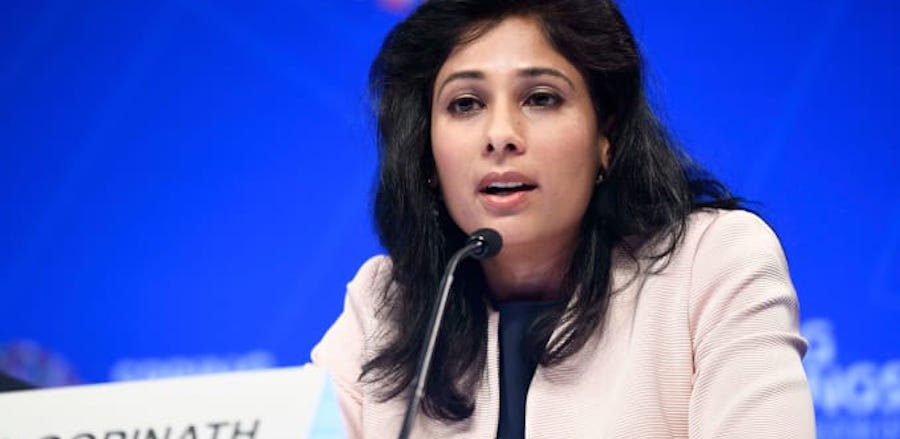Rising inflation and persistent disruption in supply chains will continue to constrict global economic recovery, the International Monetary Fund (IMF) warned on Tuesday as it called for vigilance and more targetted monetary and fiscal policies.
IMF Chief Economist Gita Gopinath also pointed to the need for the expansion of COVID-19 vaccine distribution to low-income and developing countries, as well as the need to “slow” rising global temperatures, as priority areas going forward.
This comes as the IMF trimmed its global economic growth forecast marginally to 5.9 per cent this year, down from the six per cent it predicted in July. Global growth projection remains unchanged for next year at 4.9 per cent.
This downward revision, the IMF said in its Global Economic Outlook report, was a reflection of continuing supply disruptions and the impact on advanced economies.
Speaking at a virtual press briefing on Tuesday, Gopinath said while there was a rebound in demand, supply has not been able to return as fast.
“That combination has led to high levels of inflation. We have seen that in commodity prices and we have also seen that in supply chain breakdowns,” said Gopinath.
While indicating that this situation is expected to persist towards the middle of next year, she said “there is tremendous uncertainty”.
“We have never seen a recovery of this kind where you have shortages in the labour market, at the same time you have high levels of unemployment. So this is very unique and we have to be particularly vigilant,” she warned.
While the IMF has slashed the growth rate for many producing nations, it maintains that the Barbados economy will grow by some 3.3 per cent this year and 8.5 per cent in 2022. This is in line with the June forecast by the World Bank.
Gopinath cautioned that while the global economic recovery continued the momentum had weakened.
Latin America and the Caribbean is projected to grow by 6.3 per cent this year and three per cent next year, through uneven across countries.
Pointing to the need for monetary policies that will “need to walk a fine line between tackling inflation and financial risks and supporting economic growth”, Gopinath said: “We project, amidst high uncertainty, that headline inflation will likely return to pre-pandemic levels by mid-2022 for the group of advanced economies and emerging and developing economies.
“There is, however, considerable heterogeneity across countries with upside risks for some, like the United States, United Kingdom, and some emerging market and developing economies.
“While monetary policy can generally look through transitory increases in inflation, central banks should be prepared to act quickly if the risks of rising inflation expectations become more material in this uncharted recovery. Central banks should chart contingent actions, announce clear triggers, and act in line with that communication.”
She said the outlook for low-income and developing countries has taken a turn for the worse due to worsening pandemic dynamics, while projections for some commodity exporters have been upgraded on the back of rising commodity prices.
On the COVID-19 pandemic, Gopinath highlighted the continued spread of the Delta variant, warning that should the pandemic continue into the medium-term it could reduce global GDP by a cumulative US$5.3 trillion over the next five years, relative to current projection.
“It does not have to be this way,” she declared. “The global community must step up efforts to ensure equitable vaccine access for every country, overcome vaccine hesitancy where there is adequate supply, and secure better economic prospects for all.”
Stating that the “dangerous divergence of economic prospects across countries remains a major concern”, Gopinath said “these divergences are consequence of the great vaccine divide and large disparities in support”.
While some 60 per cent of the population in advanced economies is fully vaccinated against the COVID-19 virus with some having booster shots, 96 per cent of the population in low-income countries remain unvaccinated, she noted.
She said the situation was compounded by tighter fiscal space for many emerging markets and developing economies.
Pointing to the increases in food prices in low-income countries and developing economies, she warned that food insecurity was acute, adding to the burden of poorer households and raising the risk of social unrest in some places.
“The foremost priority, therefore, is to vaccinate at least 40 per cent of the population in every country by the end of this year, and 70 per cent by the middle of next year,” said Gopinath.
She said this would require high-income countries to fulfill vaccine donation pledges, coordinated efforts to prioritise delivery to the United Nations-backed COVAX vaccine purchase facility in the near-term and the removal of restrictions on the flow of vaccines.
marlonmadden@barbadostoday.bb




